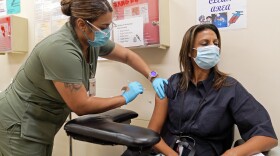Researchers at UT Austin played a leading role in the development of COVID vaccines. Now, some of them have made a discovery that might hold the key to treating not only COVID-19, but all coronaviruses.
When the first vaccines by Pfizer and Moderna became available at the end of 2020, a team of scientists from UT saw years of work come to fruition. Long before the world had heard of COVID-19, the team was studying coronaviruses, a family of viruses that typically cause upper respiratory illnesses, including the Middle Eastern respiratory syndrome (MERS) and some colds.
Now, years after COVID emerged, the team's work continues.
“We’re constantly getting more information which helps us fine-tune our strategies,” said Jennifer Maynard, a professor in UT’s Chemical Engineering Department. “We’re constantly learning more about this virus and how it can change, and we have to adapt in response.”
Maynard and her lab began collaborating with Jason McLellan, a UT professor credited as one of the inventors of the technology used in popular COVID vaccines, in 2019. Their work focused on spike proteins, which dot the surface of a coronavirus and help it to fuse with human cells, kicking off an infection.
According to researcher Annalee Nguyen, this work was on pause while she and her colleagues considered what angle to take in their research. Then, COVID-19 emerged, and they kicked into high gear. Nguyen pulled her research out of the lab freezer — literally. She and others in Maynard’s lab looked for antibodies that could hinder this new coronavirus by adapting research that was initially geared toward MERS.
“We have these big libraries of a bunch of different antibodies to look through, and then we’d try to find the ones that bind to something interesting,” Nguyen said.
It worked. Last month, Nguyen co-authored a study highlighting antibodies that bind to a specific area of the coronavirus’ spike proteins — a small hinge called an epitope. It’s unlikely to mutate and is also found across all known pathogenic coronaviruses. Folks at UT are calling this component the “Achilles' heel” of coronaviruses.
More COVID protection?
Nguyen and her colleagues hope their research could bring about vaccines and treatments that work for most coronaviruses. They also hope it could help against COVID-19.
While experts say the COVID vaccines currently available do a good job against severe cases of the disease, there is room for improvement.
Vaccines like those created by Moderna and Pfizer deliver a bit of genetic material called mRNA to the body. The mRNA teaches cells to recognize the spike proteins found on the surface of coronaviruses. If someone has been vaccinated, their body will know to fight back against the virus when it enters the body and prevent the spike proteins from fusing with cells.
But SARS-CoV-2, the virus that causes COVID-19, is good at mutating, creating new variants that the body is not as prepared to fight.
“It changes very quickly, which we've seen as the coronavirus sort of evades our own immunity from either vaccination or from getting sick,” Maynard said.

This is where the latest research from UT comes in. Maynard’s lab is focused on a different area of the spike protein, a region that’s more stable and less prone to mutation.
The spike protein has two main regions. Together, they form something that Maynard says looks a bit like a lollipop. There’s a round head region that binds to receptors on cells; this is the area that can easily mutate. There is also a stem region — the stick of the viral lollipop — that remains stable and is not prone to mutation because it holds important machinery that allows the virus to invade cells.
By focusing on this stable stem region, Maynard and her colleagues believe it's possible to develop vaccines coronaviruses will have a harder time evolving around.
Researchers have already identified a type of antibody that attacks the epitope, found in the stem region. So far, the antibodies haven't been able to completely neutralize SARS-CoV-2. However, Nguyen says a vaccine using this method might potentially offer a degree of protection against a whole array of illnesses, making the effects of current and potential coronaviruses less potent.
“Then [if a new coronavirus emerges] you at least have the benefit of potentially not having this been your first-ever exposure to something similar,” Nguyen said. “That's the big problem with SARS-CoV-2, is that so many of us had never seen anything that our body could recognize about it.”
Antibody therapies
In addition to vaccines, research on this stem region of the spike protein could lead to antibody therapies for coronaviruses. Researchers saw the antibodies trigger an immune response that kills infected cells.
This would be a boon in the fight against COVID-19, because the antibody treatments that were once popular to treat the illness aren’t effective anymore; COVID mutated to avoid them. The federal Food and Drug Administration has revoked its emergency use authorizations for all such treatments.
At this point, Maynard, Nguyen and their colleagues don’t yet have a timeline for when a treatment, vaccine or booster might be developed from their discovery. Maynard says the scientific method is still well underway.
“We have these hypotheses we don't know the answer to, and we're going to go test and see what the different benefits and tradeoffs of these different approaches [are],” Maynard said. “We'll hopefully use that information then to design something that will work really well for everybody.”









